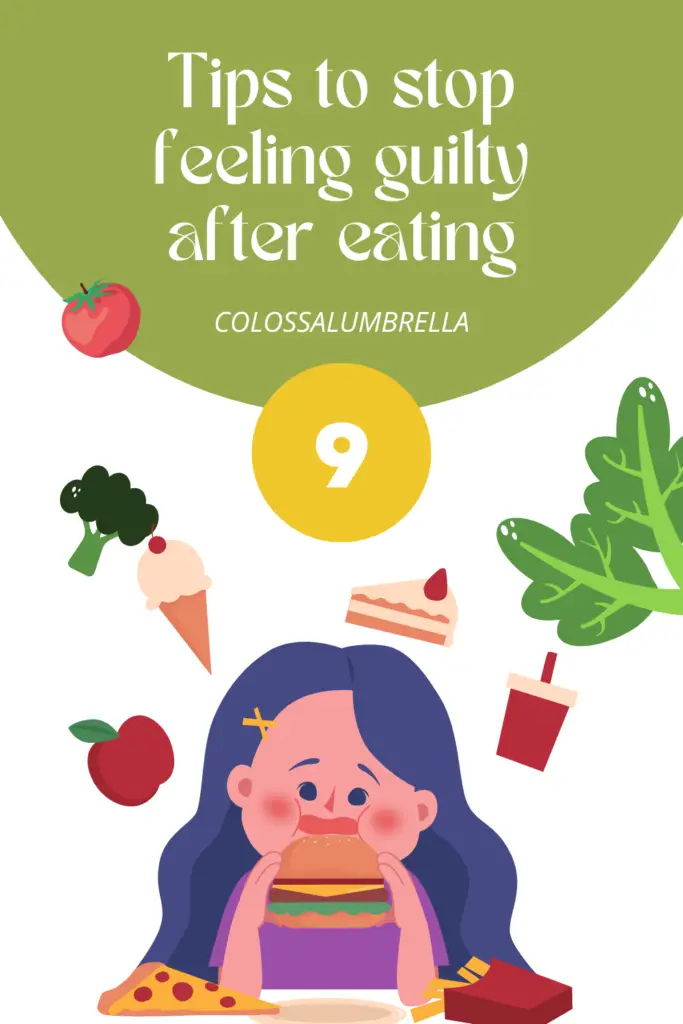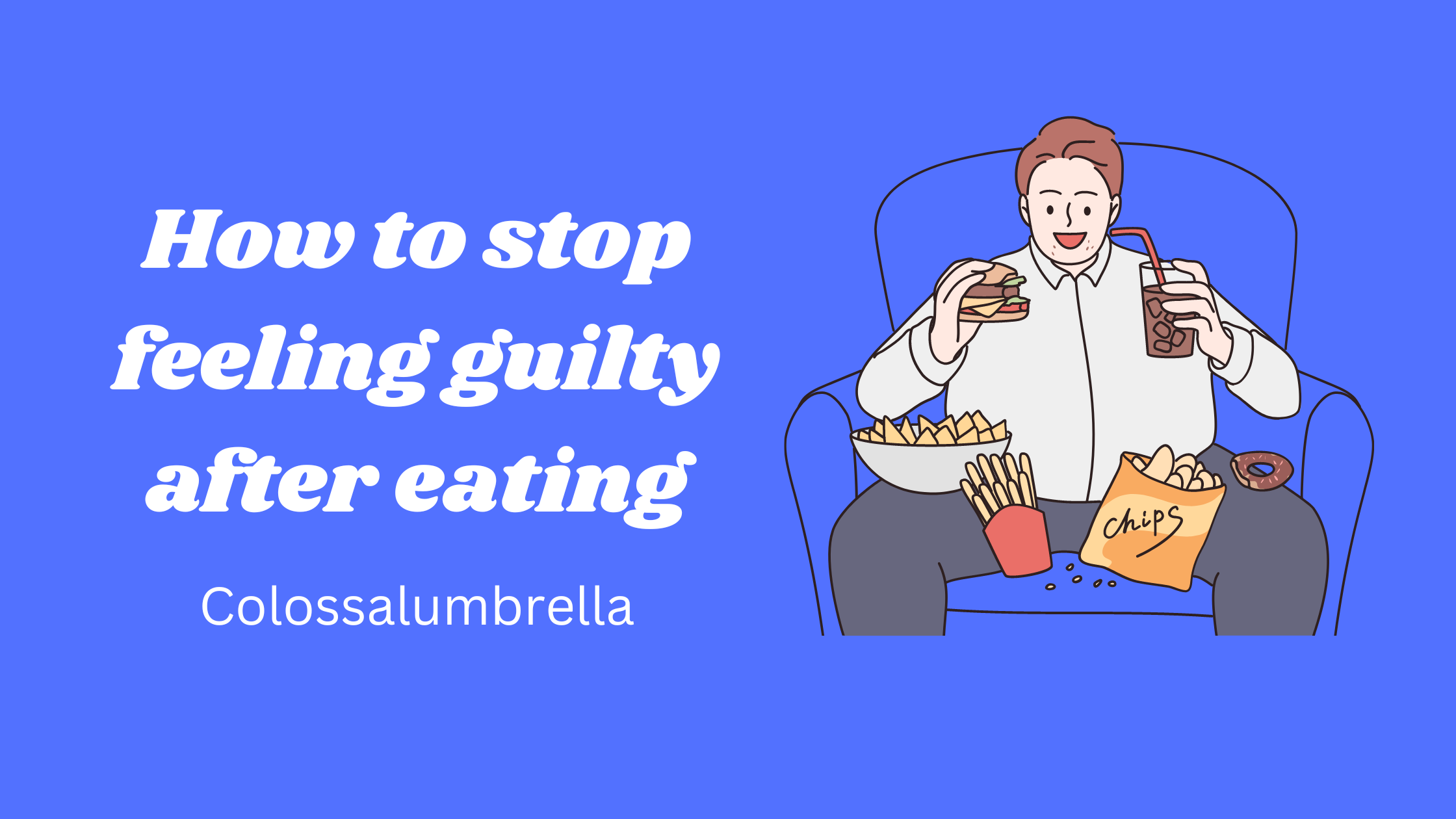If you’re like most people, you probably find yourself feeling guilty after eating something that isn’t healthy. To help get past these negative thoughts and emotions, this blog post cover 9 ways how to stop feeling guilty after eating.
With holiday season around the corner, many people struggle with food guilt. Maybe it was a junk food or maybe it was something with lots of sugar and carbs. When this happens, you feel like you’ve failed in some way. You think about how much better your life would be if only you could stop eating things that aren’t good for you. The problem is that feelings of guilt after eating bad foods only make things worse. Instead of encouraging more self-discipline, they just make you feel bad about yourself even more!
Read about how to deal with someone who wants to destroy you
What is it called when you feel guilty for eating?
When you feel guilty after eating, it is called food guilt. Food guilt is type of emotional problems we feel when we eat something that conflicts with our personal standards of morality or ethics. Food guilt can be triggered by moral judgments, issues of personal responsibility, or other moral biases. These judgments typically stem from a perceived lack of control over one’s food intake, emotional eating, binge eating and may be based on fear of weight gain, body image concerns, or other food-related issues.
Food guilt can also result from beliefs that certain foods are inherently more deserving of respect than others. For example, some people may believe that meat is a more noble source of nutrition than vegetables, leading to feelings of guilt when they consume meat. The beliefs and fears behind food guilt can vary widely from person to person, so it’s important to recognize the underlying causes and work through them.
5 Reason why do people feel guilty after eating
There are several reasons why people feel guilty after eating. For example, they might have eaten a large meal and feel that they should eat smaller portions to prevent weight gain. Or, they might have eaten something they weren’t planning to eat and feel bad about it.
- One of the most common causes of guilt is that the person has a distorted view of the amount of food that he or she needs to consume. Often, people think that they need to eat a certain amount of food every day, even if their body doesn’t necessarily need all of that food. This can lead to feelings of guilt and frustration when the person realizes that he or she isn’t actually hungry for as much food as he or she thought was needed.
- A second reason why people might feel guilty after eating is because they feel like they should be able to control their appetite. The reality, however, is that most people don’t have complete control over their appetite or on the types of food they eat. In fact, there’s evidence that suggests that most people are unable to accurately predict how much food they’ll be eating in a given period of time.
- The biggest reason is that we’re conditioned to feel guilty when we eat something that’s forbidden. That’s because the human brain has a “forbidden fruit” response that makes us want to eat things that aren’t good for us. Guilt is a feeling of responsibility for what you’ve done, whereas shame is an emotional reaction to your own flaws or shortcomings.
- Guilt can also be triggered by negative emotions like anxiety and stress. When these feelings get too high, they can cause you to overeat in an attempt to relieve them. So the key is to recognize when you’re feeling guilty and take steps to reduce it. When you eat something, you’re going to feel a range of positive and negative emotions. These feelings might be caused by your body’s reaction to food, which is called the “appetite response.” Or they may be a result of other factors, like stress or low self-esteem.
- Social media being a powerful tool does play an important role adding to our guilt factor. Looking at food choices and restrictive diets followed by people for weight loss impacts our thought process. Diet culture has become a popular trend over the last few decades as it promises to offer various healthy eating benefits to people. However, there is no denying that many people have struggled to maintain their diets over the long term. For this reason, it is important to consider why you should not follow a diet before you start.
9 Ways on how to stop feeling guilty after eating
Identify the cause
The first step is to take a deep breath and try to find a probable cause about feeling guilty after eating. It can be different from normal feelings of satiety, like when you feel full or satisfied with your current meal. Food guilt can make you feel like you’re doing something wrong, especially if you’ve eaten something unhealthy.
Talk to a Friend
If you’re feeling guilty after eating something unhealthy, talk about it with a friend. Eating is often a very private thing, so having another person there to talk with you can help to open up and let go of these feelings. In particular, talk to a friend who has the same eating habits. If you have a friend who is a “normal eater”, they may not be able to fully understand what you’re going through.
If you eat mostly healthy foods but have a few treats here and there, talk to a friend who eats the same way as you. They can better understand what you’re going through, and that can help you to let go of the guilt you’re feeling.

Go for a long run
Sometimes, eating something unhealthy is just a bad day. You’re tired and in a bad mood and want to eat something to make yourself feel better. Sometimes, a couple of slices of pizza just feel like the right thing to eat. If you catch yourself feeling guilty after eating something that isn’t healthy, go for a run. Run until you feel better. Let the pace, the rhythm, and the repetition helps you to let go of these negative emotions. Walking and running is a great way to feel happy and positive.
Try Meditating
If walking and running doesn’t help, try a different approach by meditating. Focus on your breath as it goes in and out of your body. Let your mind wander as it desires. When you notice that you’ve been thinking negatively or unable to tackle your guilty feeling , bring your attention back to your breathing. Let the silence of your meditation help you to release these negative emotions once and for all. Meditation is a part of a healthy lifestyle and based on my personal experience, I would recommend incorporating it.
How to Deal With Littering Neighbors: 5 Easy Ways To Handle It
Write Down What You’re Grateful For
Feeling guilty after eating is often a sign that you’re not focused on what you have, but on what you don’t have. When you eat something that isn’t healthy, you feel like it’s the only thing that will make you happy. This isn’t true! Sometimes, you just need to be reminded of all that you already have in life. To help get your focus back on what you’re grateful for, try writing down 3 things you’re grateful for every day. This will help to keep you in a positive frame of mind and help you to forget about eating unhealthy foods as a way to make yourself happy.
Guilt is Just Pain in Disguise
When you feel guilty after eating, recognize that guilt is just pain in disguise. You might feel guilty because you know a certain food item was bad for you. You might feel guilty because you know that your diet is an expense that you can’t afford. You might feel guilty because you know that eating particular food will make it harder for you to reach your goals.
You might be feeling guilty because you know that eating this food is cruelty-free. Whatever the reason, recognize that guilt is just pain in disguise. It’s the discomfort that you feel when you know that you’ve done something against your moral code. Let the pain go and let this guilt fade away so that you can feel better once again.
Commit to eating healthier next time
Sometimes, eating something unhealthy is just a one-time slip-up. Maybe you’re eating something unhealthy and you feel guilty, but you don’t want to beat yourself up over it. Maybe you’re eating something unhealthy and you feel guilty but you don’t know how to let go of these feelings. In both of these situations, commit to mindful eating next time. Recognize that you’re human and that you’re allowed to make mistakes. Commit yourself to follow a well-balanced diet next time.
Subscribe today and get access to free planner and coloring Printables
Commit to Being Kind to Yourself Next Time
Sometimes, eating something unhealthy is a sign that you need a break. Maybe you’re overworked and need a moment to relax. Maybe you’ve been dieting hard and need a break from the pressure. Or maybe you’re just on a bad day. Whatever the reason, commit to being kind to yourself next time. Let go of these feelings of guilt and give yourself a break from the pressure to be healthy all the time. Find other things to focus on, like reading a good book, watching a funny movie, or spending time with friends and family. Let go of these feelings of guilt and let yourself relax for a moment so that you can feel better once again.
Snack on these yoga bars to feel less guilty.
Conclusion
There are many ways to stop feeling guilty after eating something unhealthy, but you have to be willing to do the work. The bottom line, is that you have to be willing to put in the effort to change your eating habits and change the way you feel. If you’re ready to stop feeling guilty after eating, take these tips and implement them in your daily life.
If you have extreme sense of guilt or constant feelings of helplessness, one of the best ways to deal with is to talk to health professional. Eating healthier and feeling better is definitely worth the effort. Take charge of your eating!

2 thoughts on “9 Ways on how to stop feeling guilty after eating”